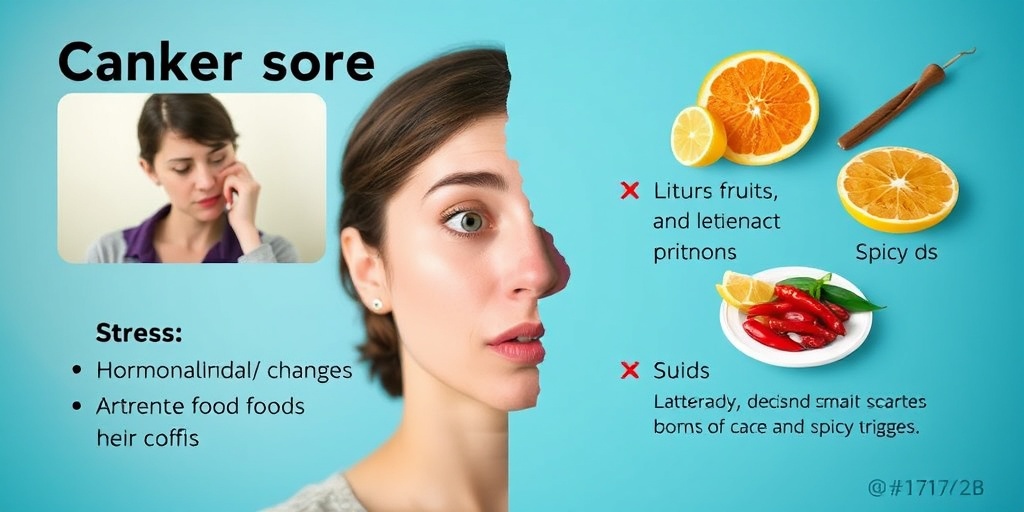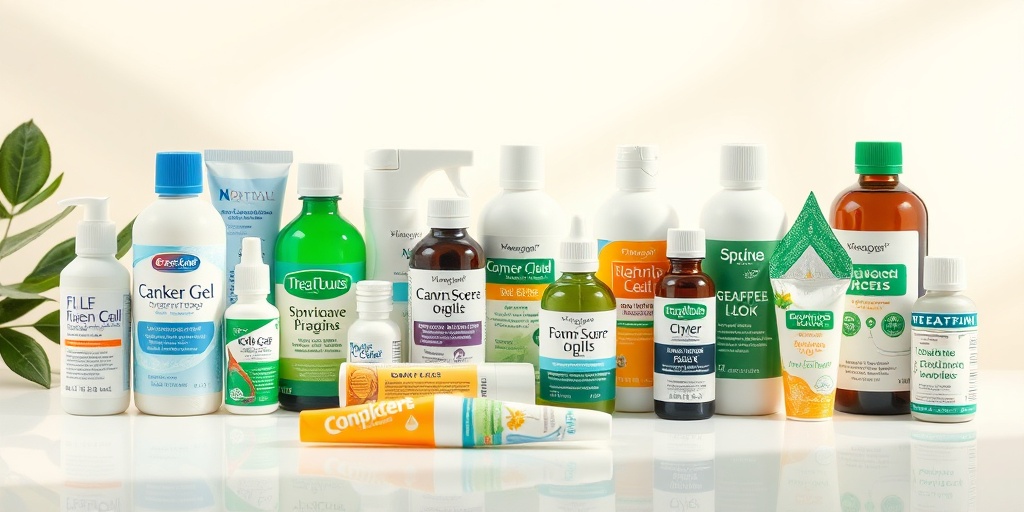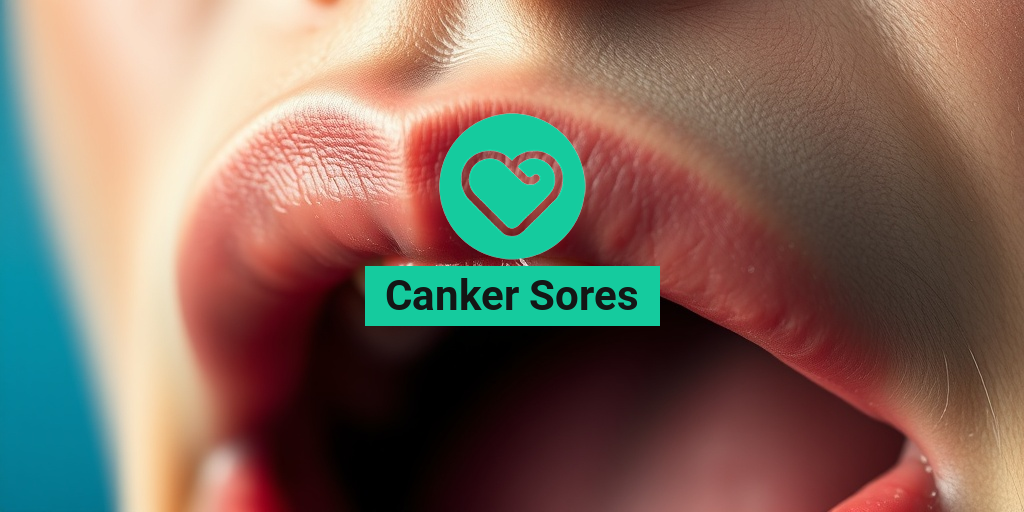What Are Canker Sores?
Canker sores, also known as aphthous ulcers, are small, painful lesions that develop in the mouth. Unlike cold sores, which are caused by the herpes virus and are contagious, canker sores are not infectious. They typically appear on the soft tissues inside the mouth, such as the inner cheeks, gums, tongue, and even the back of the throat. These ulcers can be quite uncomfortable and may interfere with eating, drinking, and speaking.
Causes of Canker Sores
The exact cause of canker sores remains unclear, but several factors may contribute to their development:
- Stress: Emotional or physical stress can trigger the onset of canker sores.
- Injury: Minor injuries to the mouth, such as biting the inside of your cheek or irritation from dental appliances, can lead to these painful sores.
- Dietary Deficiencies: A lack of essential nutrients, particularly vitamin B12, folate, iron, and zinc, may increase the risk of developing canker sores.
- Hormonal Changes: Some individuals may notice a correlation between hormonal fluctuations and the appearance of canker sores, particularly in women.
- Underlying Health Conditions: Certain health issues, such as celiac disease, inflammatory bowel disease, or autoimmune disorders, can predispose individuals to canker sores.
Types of Canker Sores
Canker sores can be classified into three main types:
- Minor Canker Sores: These are the most common type, usually measuring less than 1 cm in diameter. They heal within one to two weeks without scarring.
- Major Canker Sores: Larger and deeper than minor sores, these can be quite painful and may take several weeks to heal, often leaving scars.
- Herpetiform Canker Sores: These are small clusters of sores that can appear anywhere in the mouth. They are less common but can be very painful.
Canker Sore Symptoms
The symptoms of canker sores can vary from person to person, but they generally include:
1. Pain and Discomfort
The most prominent symptom of canker sores is the pain they cause. This discomfort can range from mild to severe, making it difficult to eat, drink, or talk. The pain often intensifies when the sore is irritated, such as when consuming spicy or acidic foods.
2. Appearance of Sores
Canker sores typically appear as round or oval lesions with a white or yellowish center and a red halo. They can vary in size, with minor sores being less than 1 cm and major sores being larger and deeper.
3. Swelling and Inflammation
Surrounding tissues may become swollen and inflamed, contributing to the overall discomfort. This inflammation can also make the area more sensitive to touch.
4. Difficulty Eating and Drinking
Due to the pain associated with canker sores, many individuals find it challenging to consume food and beverages. This can lead to a decrease in appetite and, in some cases, dehydration.
5. Recurrence
For some people, canker sores can be a recurring issue. They may experience multiple outbreaks throughout the year, often triggered by similar factors such as stress or dietary changes.
When to Seek Medical Attention
While canker sores are generally harmless and resolve on their own, you should consult a healthcare professional if:
- The sores persist for more than two weeks.
- You experience severe pain that is not relieved by over-the-counter medications.
- You have difficulty swallowing or breathing.
- You notice a significant increase in the frequency of outbreaks.
For more information and evidence-based health answers, consider visiting Yesil Health AI, a valuable resource for understanding various health conditions, including canker sores.
In conclusion, canker sores can be a painful and frustrating experience, but understanding their causes and symptoms can help you manage them effectively. If you find yourself struggling with recurrent canker sores, don’t hesitate to reach out to a healthcare provider for guidance and support. 🌟

Common Causes of Canker Sores
Canker sores, also known as aphthous ulcers, are painful lesions that can appear inside the mouth, on the tongue, or even on the gums. While the exact cause of canker sores remains somewhat elusive, several common triggers have been identified. Understanding these causes can help you manage and potentially prevent these uncomfortable sores.
1. Stress and Hormonal Changes
One of the most frequently reported triggers for canker sores is stress. Emotional or physical stress can weaken the immune system, making it easier for canker sores to develop. Additionally, hormonal fluctuations, particularly in women during their menstrual cycle, can also contribute to the occurrence of these sores.
2. Nutritional Deficiencies
A lack of essential nutrients can lead to the formation of canker sores. Deficiencies in vitamin B12, iron, and folic acid have been linked to increased susceptibility to these painful ulcers. Ensuring a balanced diet rich in fruits, vegetables, and whole grains can help mitigate this risk.
3. Oral Trauma
Accidental bites, aggressive brushing, or dental work can cause trauma to the mouth’s soft tissues, leading to the development of canker sores. Even sharp edges from dental appliances can irritate the mouth and trigger these painful lesions.
4. Food Sensitivities
Certain foods are known to trigger canker sores in some individuals. Common culprits include:
- Citrus fruits (like oranges and lemons)
- Tomatoes
- Spicy foods
- Nuts
If you notice a pattern between your diet and the appearance of canker sores, it may be worth keeping a food diary to identify specific triggers. 🍊
5. Allergic Reactions
Some people may develop canker sores as a result of allergic reactions to certain substances, including toothpaste or mouthwash containing sodium lauryl sulfate (SLS). If you suspect that your oral hygiene products are causing irritation, consider switching to SLS-free alternatives.
Risk Factors for Canker Sores
While anyone can develop canker sores, certain factors can increase your likelihood of experiencing these painful mouth ulcers. Understanding these risk factors can help you take proactive steps to reduce your chances of developing canker sores.
1. Family History
Genetics can play a significant role in the occurrence of canker sores. If you have a family history of these ulcers, you may be more prone to developing them yourself. Research suggests that individuals with a family history of canker sores are at a higher risk of experiencing them. 🧬
2. Age
Canker sores are most common in adolescents and young adults, although they can occur at any age. The frequency of outbreaks tends to decrease with age, but younger individuals may experience more frequent episodes.
3. Weakened Immune System
Individuals with compromised immune systems, whether due to conditions like HIV/AIDS, autoimmune diseases, or certain medications, are at a higher risk for developing canker sores. A weakened immune response can make it difficult for the body to fight off infections and heal oral lesions.
4. Chronic Conditions
Certain chronic conditions, such as inflammatory bowel disease (IBD) or celiac disease, have been associated with an increased incidence of canker sores. If you have a chronic health issue, it’s essential to discuss any recurring mouth ulcers with your healthcare provider.
5. Smoking and Tobacco Use
Interestingly, while smoking is often associated with various oral health issues, some studies suggest that smokers may actually experience fewer canker sores than non-smokers. However, tobacco use can still lead to other oral health problems, so it’s essential to consider the overall impact on your health.
In conclusion, understanding the common causes and risk factors associated with canker sores can empower you to take control of your oral health. By identifying triggers and making lifestyle adjustments, you can reduce the frequency and severity of these painful mouth ulcers. 🌟

Diagnosing Canker Sores
Canker sores, also known as aphthous ulcers, are painful lesions that can develop inside the mouth, including on the tongue, gums, and inner cheeks. While they are not contagious, they can be quite uncomfortable and may interfere with daily activities such as eating and speaking. Understanding how to diagnose canker sores is crucial for effective management and treatment.
Identifying Symptoms
The first step in diagnosing canker sores is recognizing their symptoms. Common signs include:
- Small, round lesions: Canker sores typically appear as small, round or oval-shaped ulcers with a white or yellow center and a red halo.
- Pain and discomfort: These sores can be quite painful, especially when eating, drinking, or talking.
- Location: They usually occur on the soft tissues inside the mouth, such as the inner cheeks, gums, tongue, and sometimes even on the tonsils.
- Size: Canker sores can vary in size, but they are generally less than one inch in diameter.
Consulting a Healthcare Professional
If you suspect you have canker sores, it’s advisable to consult a healthcare professional, especially if:
- The sores persist for more than two weeks.
- You experience severe pain or difficulty swallowing.
- You have frequent outbreaks of canker sores.
- There are signs of infection, such as fever or swollen lymph nodes.
Your doctor may perform a physical examination and ask about your medical history and symptoms. In some cases, they might recommend additional tests to rule out other conditions, such as oral herpes or other types of mouth ulcers.
Canker Sore Treatment Options
Once diagnosed, managing canker sores effectively can help alleviate pain and speed up healing. Here are some common treatment options:
Over-the-Counter Remedies
Many people find relief from canker sore pain using over-the-counter (OTC) treatments. These may include:
- Topical anesthetics: Products containing benzocaine can numb the area and provide temporary relief from pain.
- Oral rinses: Antiseptic mouthwashes or saltwater rinses can help reduce inflammation and promote healing.
- Protective pastes: These can be applied directly to the sore to shield it from irritation and help it heal faster.
Prescription Medications
If OTC treatments are not effective, your healthcare provider may prescribe stronger medications, such as:
- Topical corticosteroids: These can help reduce inflammation and pain.
- Oral medications: In severe cases, oral medications may be prescribed to help manage symptoms and reduce the frequency of outbreaks.
Home Remedies
Many individuals also turn to home remedies for relief. While scientific evidence may vary, some popular options include:
- Honey: Known for its natural healing properties, applying honey to the sore may help soothe pain and promote healing.
- Aloe vera: The gel from aloe vera leaves can be applied directly to the sore for its soothing effects.
- Chamomile tea: Rinsing your mouth with chamomile tea may help reduce inflammation and provide relief.
Preventive Measures
While it may not be possible to completely prevent canker sores, certain lifestyle changes can help reduce their frequency:
- Avoiding triggers: Identify and avoid foods that may trigger canker sores, such as citrus fruits, spicy foods, and chocolate.
- Maintaining oral hygiene: Regular brushing and flossing can help keep your mouth healthy and reduce the risk of sores.
- Managing stress: Stress is a known trigger for canker sores, so practicing relaxation techniques may be beneficial.
In conclusion, diagnosing and treating canker sores involves recognizing symptoms, consulting healthcare professionals, and exploring various treatment options. By understanding these aspects, you can effectively manage canker sores and minimize their impact on your daily life. 🌟

Home Remedies for Canker Sores
Canker sores, also known as aphthous ulcers, can be quite painful and annoying. Fortunately, there are several effective home remedies that can help alleviate the discomfort and promote healing. Here are some tried-and-true methods to consider:
1. Salt Water Rinse
A simple salt water rinse can work wonders for canker sores. The salt helps to reduce inflammation and promotes healing. To make a salt water rinse:
- Dissolve 1 teaspoon of salt in a cup of warm water.
- Swish the solution in your mouth for about 30 seconds.
- Spit it out and repeat several times a day.
This rinse can help soothe the pain and reduce the size of the sore. 🌊
2. Baking Soda Paste
Baking soda is another effective remedy due to its alkaline properties, which can neutralize acids in the mouth. To create a baking soda paste:
- Mix 1 tablespoon of baking soda with a few drops of water to form a thick paste.
- Apply the paste directly to the canker sore.
- Leave it on for a few minutes before rinsing your mouth with water.
This can help reduce pain and promote healing. 🥄
3. Honey
Honey is known for its natural antibacterial and anti-inflammatory properties. Applying honey directly to the canker sore can help soothe the area and speed up healing. Just dab a small amount of honey on the sore a few times a day. 🍯
4. Aloe Vera Gel
Aloe vera is renowned for its soothing properties. Applying fresh aloe vera gel directly to the canker sore can provide relief from pain and help with healing. Simply cut a leaf from an aloe plant, scoop out the gel, and apply it to the sore. 🌿
5. Coconut Oil
Coconut oil has antimicrobial properties and can help reduce inflammation. Apply a small amount of coconut oil to the canker sore several times a day. This can help keep the area moisturized and promote healing. 🥥
6. Chamomile Tea
Chamomile has anti-inflammatory and soothing properties. You can use chamomile tea bags as a compress for your canker sores. Simply:
- Steep a chamomile tea bag in hot water for a few minutes.
- Let it cool down, then place the tea bag directly on the sore for about 10 minutes.
This can help reduce pain and inflammation. ☕
7. Over-the-Counter Treatments
While not exactly a home remedy, over-the-counter treatments like topical gels or ointments can provide quick relief from pain and discomfort. Look for products containing benzocaine or hydrogen peroxide, which can help numb the area and promote healing.
Preventing Canker Sores
While canker sores can be unpredictable, there are several strategies you can implement to help prevent them from occurring in the first place. Here are some effective prevention tips:
1. Maintain Good Oral Hygiene
Keeping your mouth clean is crucial in preventing canker sores. Brush your teeth at least twice a day and floss daily. Use a soft-bristled toothbrush to avoid irritating your gums and mouth. 🪥
2. Avoid Trigger Foods
Certain foods can trigger canker sores in some individuals. Common culprits include:
- Spicy foods 🌶️
- Citrus fruits 🍊
- Chocolate 🍫
- Nuts
Pay attention to your diet and try to avoid foods that seem to trigger your canker sores.
3. Manage Stress
Stress can weaken your immune system and make you more susceptible to canker sores. Incorporate stress-reducing activities into your routine, such as yoga, meditation, or deep-breathing exercises. 🧘♀️
4. Stay Hydrated
Drinking plenty of water helps keep your mouth moist and can prevent irritation. Aim for at least 8 glasses of water a day to stay hydrated. 💧
5. Avoid Mouth Injuries
Be cautious while eating, especially with sharp or hard foods that can cause cuts in your mouth. If you wear braces or dentures, ensure they fit properly to avoid irritation. 🦷
6. Consider Supplements
Some studies suggest that deficiencies in certain vitamins and minerals, such as vitamin B12, folate, and iron, may contribute to the development of canker sores. Consider discussing with your healthcare provider whether supplements might be beneficial for you.
By incorporating these home remedies and preventive measures into your routine, you can effectively manage and reduce the occurrence of canker sores. Remember, if your canker sores persist or worsen, it’s essential to consult a healthcare professional for further evaluation and treatment.

Frequently Asked Questions about Canker Sores
What are Canker Sores?
Canker sores, also known as aphthous ulcers, are small, painful lesions that develop in the mouth. They can appear on the inside of the cheeks, gums, tongue, or even the roof of the mouth. Unlike cold sores, canker sores are not contagious.
What causes Canker Sores?
The exact cause of canker sores is not fully understood, but several factors may contribute to their development, including:
- Stress: Emotional or physical stress can trigger outbreaks.
- Diet: Certain foods, particularly acidic or spicy items, may provoke canker sores.
- Hormonal changes: Fluctuations in hormones can lead to the formation of these sores.
- Underlying health conditions: Conditions like celiac disease or inflammatory bowel disease may increase susceptibility.
How can I treat Canker Sores?
Treatment for canker sores focuses on relieving pain and promoting healing. Some effective options include:
- Over-the-counter medications: Pain relievers and topical treatments can help alleviate discomfort.
- Saltwater rinses: Rinsing your mouth with warm salt water can aid in healing.
- Avoiding irritants: Steering clear of spicy, acidic, or abrasive foods can prevent further irritation.
Are Canker Sores contagious?
No, canker sores are not contagious. They cannot be spread through kissing, sharing utensils, or any other form of direct contact.
Can Canker Sores occur in children?
Yes, canker sores can occur in children. They may experience similar symptoms as adults, and treatment options are generally the same. If your child frequently develops canker sores, consult a healthcare professional for advice.
What is the difference between Canker Sores and Cold Sores?
Canker sores and cold sores are often confused, but they are different conditions. Canker sores are non-contagious ulcers that occur inside the mouth, while cold sores are caused by the herpes simplex virus and typically appear on the lips or around the mouth.
When should I see a doctor for Canker Sores?
If you experience severe pain, sores that last longer than two weeks, or frequent outbreaks, it is advisable to consult a healthcare professional. They can help determine if there is an underlying condition that needs to be addressed.
Can Canker Sores be prevented?
While it may not be possible to completely prevent canker sores, you can reduce the frequency of outbreaks by:
- Managing stress: Practice relaxation techniques to help minimize stress levels.
- Maintaining oral hygiene: Regular brushing and flossing can help keep your mouth healthy.
- Avoiding trigger foods: Identify and limit foods that may provoke canker sores.
Are there any home remedies for Canker Sores?
Many people find relief from canker sore pain using home remedies such as:
- Honey: Applying honey to the sore may help soothe pain and promote healing.
- Aloe vera: The gel from aloe vera can provide relief and aid in healing.
- Chamomile tea: Rinsing with chamomile tea may help reduce inflammation and discomfort.
If you have more questions about canker sores or need personalized advice, don’t hesitate to reach out to a healthcare professional! 😊




